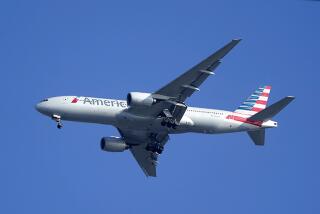Booking, Bag, Smoke Rules Remain : Bothered Fliers Have Few Rights Since Deregulation
- Share via
NEW YORK — What are your rights if you are inconvenienced in connection with a flight? If you are overbooked and bumped? If your baggage is lost? If your plane is late or your flight is canceled? What if the airline tries to seat you in the smoking section?
Actually, you do not have many rights anymore. It is all the result of airline deregulation.
“As part of the deregulation of the airlines, the federal government no longer supervises most airline/passenger relationships,” says a booklet put out by the Aviation Consumer Action Project, a nonprofit consumer group founded by Ralph Nader in 1971. “You, the passenger, are now practically on your own when it comes to dealing with the airlines.”
With the exception of three remaining consumer protection rules--overbooking, baggage liabilities and nonsmoking seats--a passenger’s rights are limited to the terms of the contract made with the airline when a ticket is purchased. The contract binds the passenger and the airline, and the passenger may sue the carrier for any breach of contract. The airline may also sue the passenger.
Occasional Problem
The rules on overbooking are complex. All airlines overbook to protect themselves against people who do not show up for flights. Occasionally, all passengers with reservations show up, and then there is a problem. The Transportation Department requires that airlines first seek volunteers who will give up their seats. Only when there are not enough volunteers can an airline bump a passenger. Most airlines bump the last passengers to arrive, even if they have a seat assignment.
If the airline gets you out on a flight that is scheduled to arrive within one hour of the original arrival time, there is no bumping compensation.
If the airline gets a passenger onto a flight scheduled to arrive within one to two hours after the original arrival time, it must pay an amount equal to the fare up to $200. If an airline cannot get a passenger out within two hours (four hours on international routes), it must pay up to $400. When a passenger volunteers to give up a seat, the airline is usually willing to negotiate a mutually acceptable sum of money or free trip.
Schedules Not Guaranteed
If a flight is delayed or canceled, the airline will attempt to get the passenger to the destination. But the airlines do not guarantee their schedules. Each airline has its own policies regarding what it will provide to a delayed passenger or one whose flight has been canceled. Some provide meals, phone calls and hotel rooms. Others--often the low-fare carriers--will not provide any amenities. Some carriers will find passengers alternative flights.
The liability limit for lost baggage is $1,250 per passenger on all flights on planes with more than 60 seats. Passengers can purchase excess baggage insurance. If a bag arrives damaged or if its contents are damaged, the airline will usually pay for repairs or negotiate a settlement minus depreciation. If baggage is lost or delayed, the airline will generally reimburse reasonable out-of-pocket expenses, such as for toilet articles.
Transportation Department rules require that airlines provide a nonsmoking seat for all passengers, but only if they meet the check-in deadline. Standby passengers do not have this right. If needed, the airline must expand the nonsmoking section, but it does not have to provide the seat of the passenger’s choice.
Smoking is prohibited on all commercial aircraft with fewer than 30 seats. Smoking is prohibited on any commercial aircraft if it is on the ground, and in all galleys and toilets. Cigar and pipe smoking are not allowed on any commercial flights.
More to Read
Sign up for The Wild
We’ll help you find the best places to hike, bike and run, as well as the perfect silent spots for meditation and yoga.
You may occasionally receive promotional content from the Los Angeles Times.






